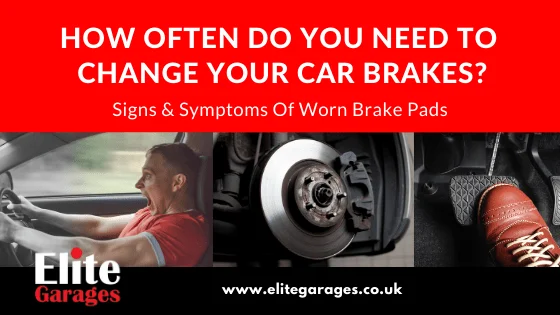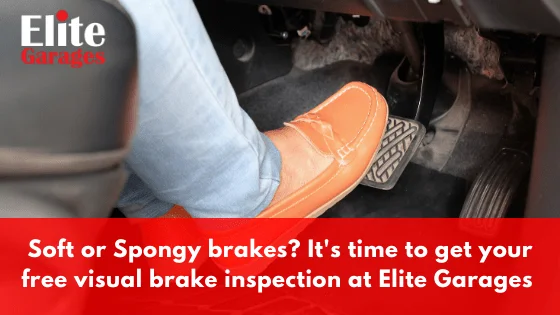
How Often Should Car Brakes Be Changed?
Your car brakes perform a vital function and must be well maintained to operate at their absolute best. The main components of your car’s brake systems include brake calipers, brake pads and brake discs. Brake pads usually need to be replaced after approximately 50,000 miles but some as early as 25,000 miles.
The amount of wear and the elapsed time depends on several factors from driving habits, the environment, materials used and brake pad hardness. In some cases, brake pads can last for up to 70,000 miles but it will depend on how you drive and the type of brake pad fitted.
Why Do Brakes Wear?
We briefly mentioned the causes of brake pad wear and to help you understand how everything works, here is a more detailed explanation.
It All Starts With Driving Habits
How hard you push the brakes has a significant effect on the longevity of the brake pads. While some drivers ride the brakes and often stop abruptly, others come to a gentle, gradual stop. The best way to increase the lifespan is to brake gently and gradually but in emergency situations, drivers have no choice but to brake hard and fast. Driving habits also play a vital role in fuel economy and tyre wear.
Recommended: ‘Driving Habits That Could Damage Your Car’
Environmental impact
The environment also impacts our vehicles especially with stop-and-start traffic and the many traffic lights. Urban driving, especially in busy city centres, is much harder on the brakes than driving on the open road as we don’t have to brake as often. In mountainous areas with regular elevation changes, brake wear is more prevalent as drivers ride the brakes to safely control downhill speed.
Type Of Brake Pads
Brake pads aren’t all the same and come in various compounds to suit different driving needs. Hard compound brake pads may last longer but they typically need to be warm to perform at their best. These types of pads are more commonly used on performance cars. Soft compound brake pads, on the other hand, perform better at low speeds such as urban areas. When driving too hard, the excess heat can actually melt the compound onto the brake disc and reduce braking performance.
Type of materials
The type of materials that the brake disc and brake pads are made from also impacts durability. Carbon-ceramic brakes are the preferred choice for many and while they last longer than standard metal brakes, they must be warm to increase effectiveness.
Carbon-ceramic brakes are also rather expensive and can be found almost exclusively on high-performance sports cars. Steel or other metal brakes are common on most cars as they are more affordable and more than adequate to suit various driving conditions.
There is nothing you can do to completely avoid wear as it eventually happens to all car brakes. The only thing you can control is how you drive and the type of brake pads you fit. Visit Elite Garages for a free visual brake check if you have any concerns about the condition of your brakes.
When Should I Change My Car Brakes?
Making sure your brake pads are working properly and replaced at the right time is essential. Not only will you save money in the long run but it can also help keep you safe in a potentially dangerous situation. This is why you should know when to replace your old brake pads and what signs to look out for.
Regardless of the type of brake pads whether carbon-ceramic, organic or metallic, friction from braking removes small amounts of protective coating from the brake pads. As your car brake pads get thinner over time, they will reach a stage where you must replace them. To make it easier for you, here are a few warning signs you need new brakes:
Screeching Or Grinding Brake Noise
The first indication of brake issues you may notice is usually a squealing, screeching or whining noise when braking. This sound comes from the small, metallic shim indicator embedded in your car brake pads for exactly that purpose. When you hear the sound regularly, it’s time to take your car to a brake specialist for an inspection.
Don’t confuse worn pads with brakes being exposed to wet or damp conditions like driving in the rain or a thin layer of dust. When this happens, it can cause a very similar screeching sound while the brakes are engaged. If the sound disappears after a few times, it’s a sign that there was some build-up and that you don’t need to replace the brake pads.
Metallic Grinding Or Growling Sounds
A low noise sounding like grinding metal or a growling sound could indicate that your brake pads are worn away and that the brake discs and calipers are making contact. This is obviously not a good situation as metal on metal contact can easily cause more damage to your braking system. If you hear this sort of noise, you should bring your vehicle to Elite Garages as quickly and safely as possible.
Less Responsive Braking
When your brakes aren’t responsive, it could be as a result of an air leak in the brake hose or leaking brake fluid. A soft or spongy brake pedal is indicative of this and you’ll also notice less responsiveness when braking. This can cause major problems, especially at high speeds which means you should get it checked out immediately.
Shuddering Or ‘Jittery Brakes’
Shuddering brakes is a possible indication that your brake discs have warped. If it’s not too severe, you can grind or clean the surface to flatten it again but a cheaper, safer and easier option is to simply replace it.
Car Pulls To One Side When Braking
If your car pulls to one side when braking, it could either be misaligned tyres or foreign material in the brake fluid. Debris in the brake fluid can also compromise braking pressure which can lead to uneven braking. When your car only pulls when braking but not always while driving, your hydraulic system could contain debris. Either way, it’s best to err on the side of caution and have it checked out.
Excessive Vibration When Applying Brakes
While normal vibrations are common, it’s not the case if your car vibrates excessively while braking. If this happens, your discs are more than likely warped which is often caused by extended periods of uninterrupted braking. Here, the heat causes the discs to wear unevenly against the brake pad. The vibration is due to the brake pads making uneven contact with the discs which reduces braking ability. Once again, if you experience this you should visit your nearest service centre immediately.
Less Than 1/4 –Inch Of Pad
Besides strange sounds and driving performance, you could also do a quick visual check. Look through your tyre spokes and you should be able to see the brake pad against the brake disc. If the pad is less than ¼ inch thick (+- 3 mm), you should consider getting experts to inspect your brakes.
Why Choose Elite Garages?
Elite Garages provide dealership quality services with exceptional value for money and no hidden costs or small print. We perform all types of vehicle maintenance from servicing all makes and models, tyres, batteries, shocks MOT’s and more. Our commitment to you is clear with the ‘Elite Price Promise’.
“If you find a genuine printed cheaper price for the same product which is in stock we will meet or beat this price at the time of purchase.”
If you suspect that your brakes are faulty in any way get it checked right away. At Elite Garages, you can book a FREE visual brake check where our expert technicians will take care of everything and give you the necessary peace of mind.
Please join our growing community on Facebook and stay updated on special offers, promotions, car maintenance tips and more.
About Us
Opening Times
Saturday : 8:30–4:00
Sunday : closed
More Information
Contact UsCustomer Information Pack
Check MOT Due Date
Free MOT reminder
Careers



